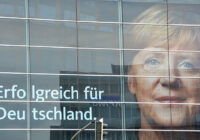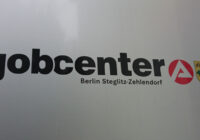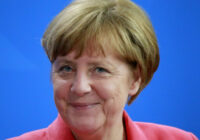The 1993 Solingen arson attack marked the climax of radical-right violence in Germany following reunification.
This year, the fatal arson attack in Solingen, a North Rhine-Westphalian city of around 160,000 inhabitants, marked its 25th anniversary. Chancellor Angela Merkel, German Foreign Minister Heiko Maas, his Turkish ministerial colleague Mevlüt Çavuşoğlu, as well as members of the victims’ family attended an official remembrance event on May 29.
On that day in 1993, four young men with ties to the local neo-Nazi group set the Genç family home on fire. Five family members — 27-year-old Gürsün, 18-year-old Hatice, 12-year-old Gülüstan, 9-year-old Hülya and 4-year-old Saime — died during the assault. In 1994, the four perpetrators, aged 16 to 23, were sentenced to between 10 and 15 years in prison. It came to light during the trial that three defendants were trained, and probably radicalized, in a combat sport school in Solingen, which was led by a confidential informant of the North Rhine-Westphalian branch of the domestic intelligence service.
This racially motivated arson attack is considered the climax of radical-right violence in Germany following reunification. In the early 1990s, Germany saw an outburst of radical-right violence erupting in murders, street violence, mass riots and arson attacks. It is estimated that radical-right perpetrators killed more than 100 people across Germany in the decade between 1990 and 2000.
The political climate during that time was tense due to a controversial public discussion on immigration and, in that context, a political argument over reform in German Basic Law that guaranteed an absolute right to political asylum. These debates were accompanied by distinct racist overtones, given that racist attitudes among the German population were widespread at the time. Amid racially motivated assaults and riots — such as in Rostock in August 1992, where rioters besieged an asylum hostel for several days — the way was paved for the parliamentary decision that asylum seekers entering from a secure country were no longer allowed to invoke the right of asylum.
Credit for this escalation of violence can be given to the election success of radical-right parties like Die Republikaner (Republicans) that inflamed the political climate with their racist statements. Especially in East Germany, the former German Democratic Republic (GDR), a viral neo-Nazi scene emerged, that could — almost unhindered — extend its structures and terrorize migrants and other minority groups.
However, the phenomenon of radical-right violence must not be placed solely at the feet of the former GDR, since all forms of radical violence also occurred in the west of the country, albeit in lesser numbers. The most lethal arson attacks of the late 1980s and early 1990s took place in West Germany. In December 1988, a neo-Nazi set fire to a house in Schwandorf (Bavaria), murdering four people, among them a 12-year-old boy. A similar arson attack to that in Solingen took place in Mölln (Schleswig Holstein) on November 23, 1992, which killed a woman and two girls with a Turkish background.
Unlike the rather indifferent reactions to the racist riots and street violence, the Mölln and Solingen attacks provoked a public outcry across Germany. Certainly, the atrocity of the crimes, especially the death of innocent children, affected the public. After the Mölln attack, several hundred thousand people participated in rallies against racist violence; awareness grew further after the Solingen attack. Authorities finally decided to take more decisive action against the neo-Nazi scene by banning radical-right organizations.
However, although radical-right violence declined after 1993, a militant neo-Nazi milieu stabilized, particularly in eastern Germany, from which the right-wing terrorist network around the Nationalist Socialist Underground arouse in the late 1990s.
The commemoration of the Solingen attack comes within a time when radical-right assaults have increased dramatically: In 2015, the numbers of racist attacks on refugee homes multiplied from 199 in 2014 to 1,031 in 2015. It is a trend that underlines a peak in radical-right activity and violence connected to the arrival of immigrants to Germany that year, as well as to the following debates on immigration. These days, a complex militant scene has been established, which although difficult to penetrate, is capable of lethal attacks.
As a lesson learned from the 1990s, it is necessary not to trivialize racist violence as apolitical peccadillo but to prosecute it as serious crime. The relative impunity many perpetrators have experienced during that time encouraged the radical movement to a great extent. Eventually, it is crucial to strengthen the concerns of the victims and their relatives — too little has yet been done in that respect.
*[Centre for Analysis of the Radical Right is a partner institution of Fair Observer.]
The views expressed in this article are the author’s own and do not necessarily reflect Fair Observer’s editorial policy.
Photo Credit: sevenMaps7 / Shutterstock.com
Support Fair Observer
We rely on your support for our independence, diversity and quality.
For more than 10 years, Fair Observer has been free, fair and independent. No billionaire owns us, no advertisers control us. We are a reader-supported nonprofit. Unlike many other publications, we keep our content free for readers regardless of where they live or whether they can afford to pay. We have no paywalls and no ads.
In the post-truth era of fake news, echo chambers and filter bubbles, we publish a plurality of perspectives from around the world. Anyone can publish with us, but everyone goes through a rigorous editorial process. So, you get fact-checked, well-reasoned content instead of noise.
We publish 2,500+ voices from 90+ countries. We also conduct education and training programs
on subjects ranging from digital media and journalism to writing and critical thinking. This
doesn’t come cheap. Servers, editors, trainers and web developers cost
money.
Please consider supporting us on a regular basis as a recurring donor or a
sustaining member.
Will you support FO’s journalism?
We rely on your support for our independence, diversity and quality.






